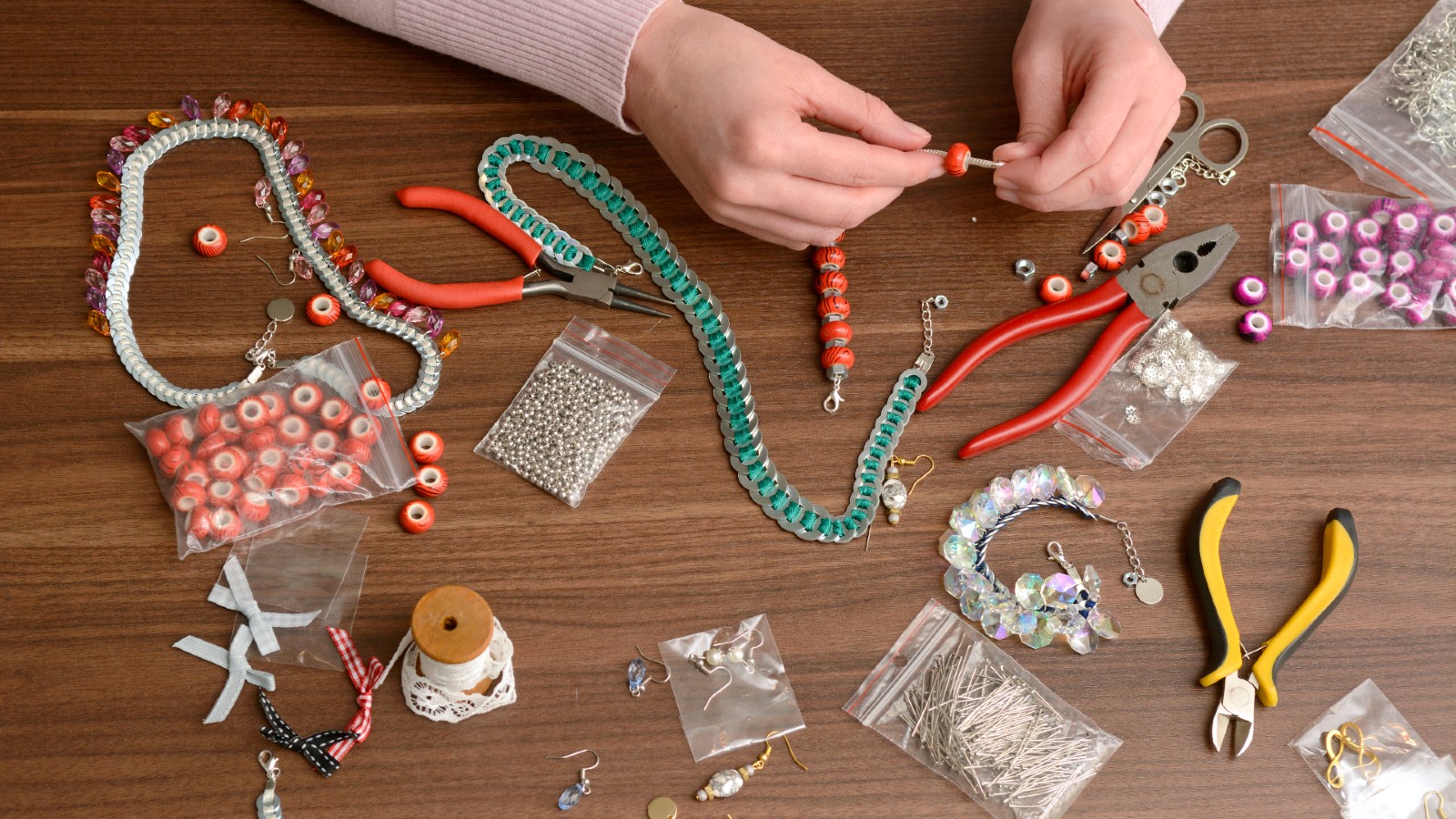Everything you need in your jewellery starter kit
Our ultimate guide to creating your own jewellery starter kit will set you off on the right track.


Have you ever walked into a shop and seen an amazing display of handcrafted jewellery and thought to yourself, ‘I could totally do that’?
Of course you have, and so have I. So while I was at home so much these past several months, I decided to actually, really, do it; I've begun making my own jewellery. I haven't even had to leave the house. I've ordered my jewellery making kits online and taught myself from videos on YouTube. There are some terrific tutorials there, but I found this YouTube series, by Jewellers Academy, the most helpful when I was getting started. For one thing, I knew exactly the supplies that I would need from the onset, so I didn't end up with a bunch of stuff that I'm not going to use. You'll see why that's a big deal. Starter kits and supplies can be somewhat expensive, but once you have your tools, you only have to replenish supplies like beads, wires, and whatnot (the whatnot are called findings).
Tools are boring, but oh-so necessary
Okay, the tools are really kind of a blast. I fancy myself creative and artsy, so I love how the tools turn a plain piece of wire into a fabulous chandelier earring with just a few twists and turns. These are the tools you need--and I mean that; they have a very specific purpose, and unless you are quite experienced, you just can't substitute and make do.
READ MORE:
- How to make a bead bracelet: the ultimate guide to getting started
- How to make earrings – quick ideas for beginners
- How to make a necklace that's both stylish and wearable
Pliers
A good set of pliers are the lifeblood of a jewellery maker. These are among the four must-haves. Once you get rolling, you can collect pliers like bakers collect tins.
These are just that; these cut your wires with a smooth edge. Don't try to use the ones in the garage because they'll give you a rough cut and likely a finger cut as well.
Round-nose pliers
Sign up for the woman&home newsletter
Sign up to our free daily email for the latest royal and entertainment news, interesting opinion, expert advice on styling and beauty trends, and no-nonsense guides to the health and wellness questions you want answered.
Use these to make loops. The jaws are tapered so that you can make different loop sizes.
Chain nose pliers
These look a lot like the round-nosed ones but have flat and shorter jaws. They're great for gripping wire without leaving a crimp or ridge and working with findings.
Crimping tool
This tool has a funny looking jaw that flattens crimp beads onto the wire, neatly and without risk of injury later.
Bead stoppers
This is a handy little gadget that keeps your beads in place on the wire. Life will interrupt your creative processes - these save your place, for when you can return to your project.
Wire, cord, and elastic thread
You must have a base for your jewellery, so memory wire and elastic thread are your go-to materials. Memory wire is tempered carbon steel that holds its shape and comes in a variety of finishes such as silver, gold, bronze, or copper. Coloured elastic thread is great for bracelets and beaded rings; it comes in several sizes, and you simply tie it off and pop on a dab of superglue to hold the knot. Easy!
Findings
Crimp beads
For me, making jewellery is quite therapeutic and squeezing the crimp beads is extreme stress relief. You use these tiny beads to secure the ends of the wire to the findings such as a jump ring or earring wire.
Headpins and eye pins
These look like your great-grandmother's hatpins: Long pieces of metal with a tiny ball on the end. Some headpins have a decorative end. Use these when you're beading. Eye pins have an open loop on the end so that you can attach them to other pieces.
Jump rings
A plain metal loop with a cut that you use to attach different components (an ear wire to a bead, or a chain to a clasp). When you really get into the swing of things, you can even make chain maille jewellery using jump rings.
Clasps
Well, you know what this is: The piece that hooks your necklace together. The cool thing about making your own jewellery is that you can hot glue just about anything to a plain clasp and have something unique.
Beadboard
I made the mistake of not getting a beadboard at the onset and thought that I could just sit at the table using a placemat or linen towel. This was a bad idea. Beads kept falling onto the floor, and my fabulous designs rolled off every which way. A beadboard not only keeps your design secure, but it also has little compartments for your beads, findings, and tools so that everything stays in place. Another handy feature is that it's got measuring marks so that you're certain the necklace you're making is the right length.
Etsy, a great source for all cool crafting things, has this jewellery kit and it's got absolutely everything needed to begin your new hobby.
So, what are you waiting for?!

Group Homes Director and in-house craft expert, Esme Clemo has over 10 years’ experience working in the magazine industry as a homes journalist. Having completed an interior design course with the University of Arts London, she’s now embarking on her second home renovation, DIYing her way through building and decor projects - meaning she has a very hands-on approach when it comes to testing out products for our reviews.
-
 Princess Beatrice just wore the maxi dress I've got my eye on for summer occasions - and she styled it with comfy Zara flats
Princess Beatrice just wore the maxi dress I've got my eye on for summer occasions - and she styled it with comfy Zara flatsShe took style tips from Kate Middleton, choosing chic French brand Sezane
By Caroline Parr Published
-
 Royal style made casual - Zara Tindall's one-shoulder dress, denim jacket and Aspinal bag are the epitome of chic summer comfort
Royal style made casual - Zara Tindall's one-shoulder dress, denim jacket and Aspinal bag are the epitome of chic summer comfortZara Tindall's outfit in Bahrain was a more relaxed take on her signature style and was made up of timeless staples.
By Emma Shacklock Published